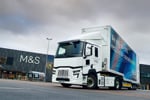Simon Hill, managing director at Total Motion looks at the rise of petrol power in fleet.
Since the early 90's, diesel has been the fuel chosen by fleets for both cars and LCV and with good reason. However, this is now changing and we are starting to see the re-introduction of petrol engines. Historically, the arguments for diesel were consumption, longevity, whole life cost, environmental - all these are now being challenged.
If we take an average of the top 5 selling family hatchbacks (Focus/Golf sized), the comparative costs over 4 years and 100,000 miles are:
Petrol. £28,386.00
Diesel £28,613.00
(These include lease rates, SMR, MPG/fuel spend, Employers NIC).
Now, we are not suggesting that every fleet rushes to change policy in the next 3 months, but what we are saying is that during the next 18 to 24 months, the change should come where petrol cars are being freely chosen again for some, if not all.
While this research has been done on a smaller car, it’s only a matter of time before the larger cars are viable.
It also needs to be considered that diesel and EV/hybrid does not appear to be the way the industry intends to go - which is another reason why petrol is making a comeback.
Slowly, over the last 10 years, many manufacturers have been working away knowing that eventually environmental restrictions and costs would mean a return to petrol.
The latest scandal with VW is just another indicator of what is about to happen while we make the move from petrol and diesel to Hydrogen and full EV - something that is mainly held back by infrastructure.
So the message is to start the process now and phase in the re-introduction of petrol with care, making sure that proper operational trials are completed before jumping in with both feet. Set a timetable and get it right.
We are at the beginning of a phase that will mean fleets have a multiple fuel policy that includes all options - diesel, hybrid, EV and petrol.
All of the volume manufacturers are currently, or about to list efficient petrol engines - the science is picking the ones that deliver a viable alternative. The last thing anyone needs is underpowered poor performing petrol engines that look good on paper.
















Login to comment
Comments
No comments have been made yet.